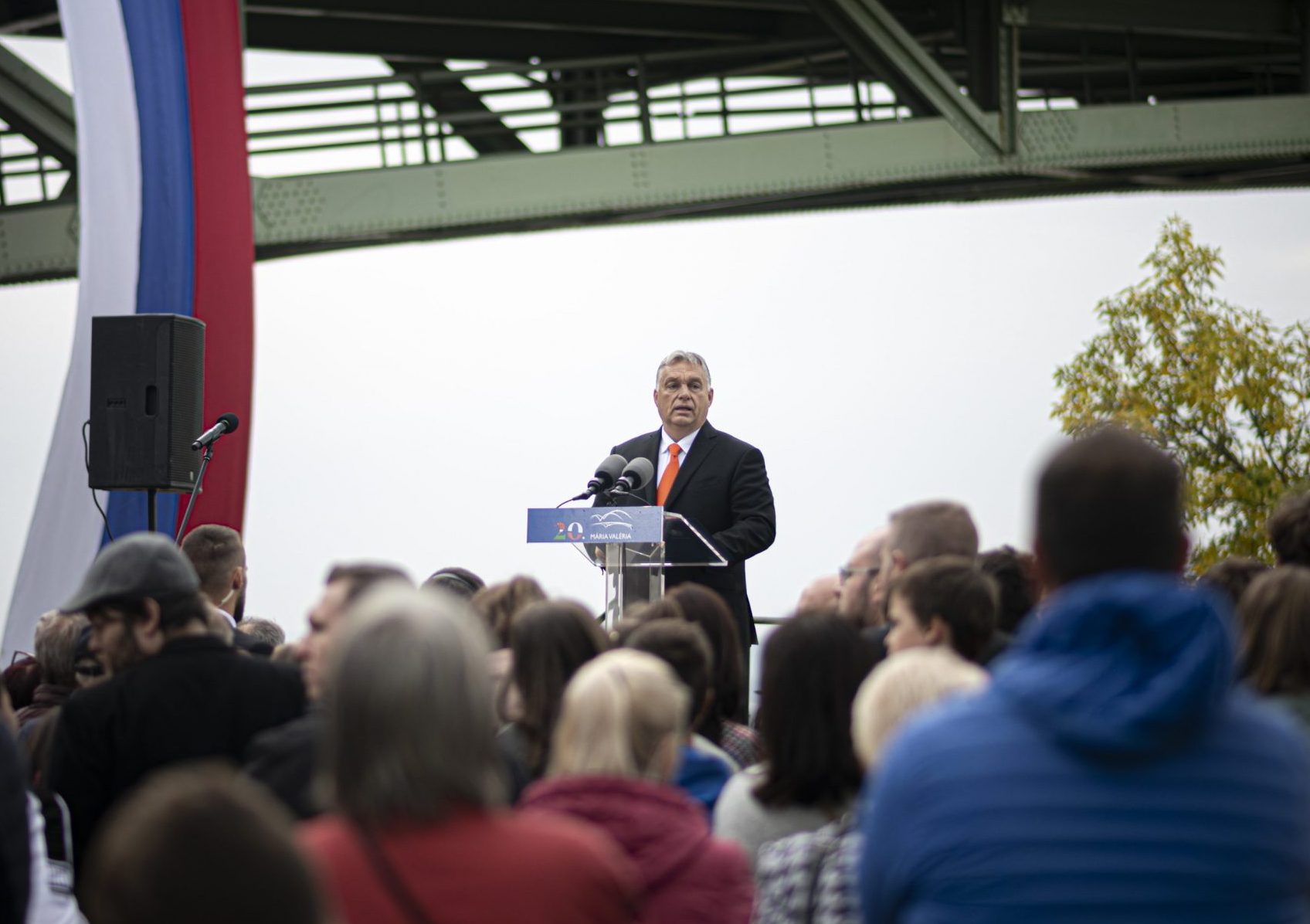
In his address, the Prime Minister highlighted that “it is easy to realise at the border of two countries which suffered a cruel lesson in the aggression of the occupiers of the last century both individually and collectively that Slovaks and Hungarians are friends sharing a common fate, not enemies”. Clever neighbours do not wage wars against each other, and are not hostile to each other, he stated.
He stressed that the cooperation of two nations that respect one another is always fruitful. “It is possible to be a proud European and Slovak, a proud European and Hungarian all at once,” it is possible to produce an economic growth that exceeds everyone else’s, it is possible to create jobs, and “in the meantime we don’t have to reject our way of life, ourselves, our past and our values,” he said.
He added that there is no successful Hungary without a successful Slovakia, and this is also true the other way around.
Mr Orbán said today they are not inaugurating a bridge, but are commemorating a bridge inauguration that took place twenty years ago. However, this is more than a mere anniversary. In a bridge inauguration speech, it is possible to point out that a bridge connects people and countries together, and the pillars protruding from the water also symbolise the firmness of our faith in our common future. He himself said similar truths 20 years ago, he recalled.
He took the view that today we must say something more and in a different tone, today different winds are blowing, today we see the world differently. At the time, it had been just a decade since “we finally shook off the Soviet collar,” we were freshly admitted members of NATO, we were only three years away from the gate of European integration, he listed, adding that we hoped that all our problems would be solved with our accession to the EU.
He said all the peoples of Central Europe had every reason to be hopeful, “we believed that the truly difficult years were already behind us, we believed that the worst was already over”.
He highlighted that that atmosphere had since flown away, had evaporated; we had to realise that we cannot trust our own future to the benevolence of external players. “Each and every day, we ourselves must fight for our own achievements,” he stated.
He observed that there are hardly any other two nations that view the world as similarly as Slovaks and Hungarians do. The only thing that actually separates us is language.
According to the Prime Minister, twenty years ago “even Brussels was on our side” and supported us, they also helped to rebuild this bridge. Today, however, they regard Central Europeans ever more frequently not as equal partners, but as second-class Member States, he laid down.
He said they want to force on us people that we do not want to live together with, they want to force on us something that would limit our economic opportunities, and “they event want to force on us a lifestyle that is contrary to everything that we see as valuable and worth preserving”. It is hard to fight this threat, he pointed out.
He said foreign great powers marched through Central Europe several times, those strangers always destroyed our bridges, and we always had to rebuild them time and again.
Mr Orbán stressed that the peoples and states of the region can only be successful if they cooperate. A successful Central Europe is only important for us, not for anyone else, and so those who argue against cooperation speak against themselves, he explained.
He said the two decades that have passed since the construction of the bridge have taught us that “it stands to reason for Hungary and Slovakia to move forward hand in hand”. This has already yielded the first tangible results, in the past decade the Visegrád Four (V4) have been able to grow continuously, he pointed out.
According to Mr Orbán, the V4 have built effective and stable cooperation, and have given common answers to civilisational crises. This was equally so during the financial, the migration and the coronavirus crises, he recalled.
The Prime Minister stated that 20 years after the rebuilding of the bridge, there is a Central European cooperation scheme which is stronger than ever. “We want to be good disciples of history; not only must we rebuild bridges, but we must also remember who destroyed them,” he said, adding that unless we do so, this will happen over and over again.
He highlighted that the Marie Valerie Bridge has remained a symbol, it conveys the message that “we are the future of Europe, and we must not allow the bridges that connect us together to be destroyed again”. Our fate continues to remain common, we have more tasks than ever, and our responsibility has increased, Mr Orbán said.


